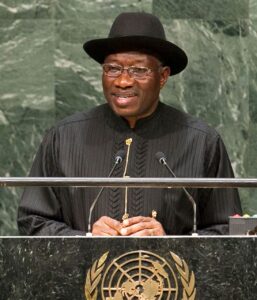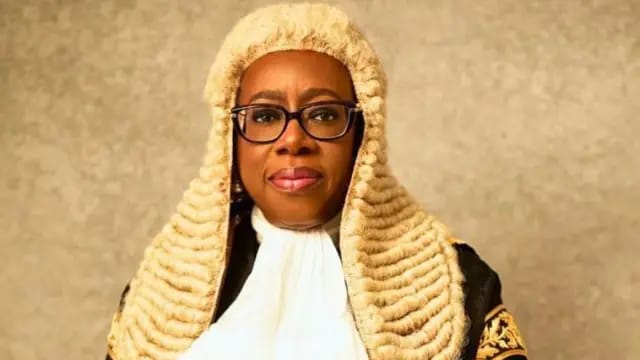By the National Patriots.
Introduction: A Nation on the Edge
Nigeria is once again standing on the precipice of a constitutional crisis. The debate over whether former President Goodluck Ebele Jonathan (GEJ) is qualified to contest the 2027 presidential elections is not just a legal puzzle; it cuts to the very heart of Nigeria’s democratic survival.

On one side are the Supreme Court’s precedents and the 2018 constitutional amendment that firmly bar Jonathan from seeking office again. On the other is a controversial 2022 Bayelsa High Court ruling that purportedly gave him clearance. The contradictions are stark and dangerous. The stakes? Nothing less than the integrity of Nigeria’s constitutional order, the credibility of its judiciary, and the stability of the polity.
Jonathan’s Controversial Rise and the 2011 Breach
Jonathan’s political journey has always been fraught with controversy. His emergence as President following the death of Umaru Musa Yar’Adua in 2010 was constitutional, but his subsequent decision to contest the 2011 election was viewed in many quarters—especially in Northern Nigeria—as a betrayal of the zoning agreement, an unwritten pact to rotate power between North and South.
Dr. Umar Ardo, a Northern politician and political scientist, captured it succinctly:
> “Jonathan’s ambition in 2011 shifted the balance of Nigeria’s political understanding. That breach remains one of the triggers of today’s instability.”
By 2015, the consequences were glaring. His re-election bid deepened regional suspicions, hardened the North-South divide, and arguably paved the way for the return of power to the North under Muhammadu Buhari.
Now, whispers of a 2027 comeback threaten to reopen old wounds and destabilize an already fragile political balance.
The Letter of the Law: What the Constitution Actually Says
Nigeria’s Constitution is explicit.
Section 137(1)(b):
> “A person shall not be qualified for election to the office of President if… he has been elected to such office at any two previous elections.”
2018 Fourth Alteration (No. 16) — Section 137(3):
> “A person who was sworn-in as President to complete the term for which another person was elected as President shall not be elected to such office for more than a single term.”
Applied to Jonathan’s case:
He was sworn in on May 6, 2010 to complete Yar’Adua’s term.
He was elected in 2011 for a fresh four-year term.
That is the one allowable election after succession. Section 137(3) shuts the door on any further bid.
Supreme Court Guidance: The Tenure Arithmetic

The Supreme Court’s landmark ruling in Marwa v. Nyako (2012) settled how to count tenure when multiple oaths or reruns occur. The Court held:
Tenure is anchored to the first oath of office.
Annulments or reruns do not “reset” the clock.
No governor—or president—can remain in office a day longer than the Constitution permits.
As Dr. Umar Ardo has argued, citing Marwa:
> “The 1999 Constitution has no room for self-succession for a cumulative tenure exceeding eight years.”
The apex court’s logic aligns perfectly with Section 137(3): Jonathan’s constitutional race is already run.
The Bayelsa High Court Judgment: A Legal Outlier
In May 2022, the Federal High Court in Yenagoa (Justice Isah Dashen) ruled that Jonathan was eligible to contest in 2023. The court argued:
1. He had only been elected once (2011).
2. Section 137(3), enacted in 2018, could not apply “retrospectively.”
This reasoning may have served Jonathan’s short-term political interests, but it is deeply flawed.
Hierarchy: A High Court cannot override constitutional amendments or the Supreme Court’s interpretation.
Timing: Applying Section 137(3) to a future election is not retrospective—it is prospective. The rule governs elections held after 2018, including 2027.


Logic: The spirit of Marwa demands strict tenure enforcement.
As Dr. Gloria Fraser, MFR, of the National Patriots, observed:
> “The Bayelsa High Court ruling cannot stand as the last word on such a grave constitutional matter. The appellate courts must put this controversy to rest once and for all. The NJC, on its part, should examine whether that judgment was an error or influenced by inducement, because the integrity of the judiciary is at stake.”
The NJC’s Role: Guarding Judicial Integrity
The National Judicial Council (NJC) does not decide constitutional interpretation—that is for the appellate courts. But it does safeguard judicial integrity. If credible evidence exists that the Bayelsa ruling was procured or tainted, the NJC has both the power and duty to investigate.
It can:
Query the judge involved.
Determine if the ruling was a legal misinterpretation or misconduct.
Sanction accordingly.
This dual track—appellate correction of law and NJC investigation of integrity—is essential to maintain public confidence.
Comparative Lessons from Abroad
Other democracies have faced similar tests, and their courts stood firm.
United States: The 22nd Amendment caps presidents at two elections. Even the wildly popular Dwight Eisenhower and Ronald Reagan accepted it as binding.
Kenya: The Supreme Court shut down attempts to extend Uhuru Kenyatta’s tenure beyond two terms, reinforcing democratic limits.
Liberia: Ellen Johnson Sirleaf respected her term limit despite pressure to continue. Her example is cited globally as constitutional patriotism.
Zambia: Courts have strictly interpreted tenure rules, preventing any manipulation of presidential timelines.
The lesson is universal: term limits exist to be respected, not tested.
Political and Social Implications of a 2027 Bid
Jonathan’s re-entry would not be a neutral act. It risks:
Re-igniting zoning disputes, deepening North-South divides.
Delegitimizing the Constitution, if courts appear pliant.
Destabilizing governance, with renewed protests and political unrest.
An African statesman once warned:
> “A leader must know when to leave the stage. Staying beyond one’s time invites not just disgrace but disaster for the polity.”
For Nigerians, the danger is clear: allowing Jonathan to run again would drag the country into a needless crisis.
Conclusion: The Constitution Must Prevail
The question is no longer political. It is constitutional.
The law is clear: Section 137(3) bars Jonathan.
The Supreme Court is clear: Tenure is capped by the first oath.
The people are watching: Will the judiciary defend the Constitution, or allow expediency to triumph?
As Dr. Fraser warned:

> “Respect for the Constitution is the foundation of democracy. Without it, Nigeria risks descending into lawlessness.”
Jonathan’s legacy depends on the choice he makes now. He can respect the Constitution and bow out gracefully, or plunge Nigeria into a constitutional storm that will forever tarnish his name.
Final Word: For the sake of Nigeria’s democracy, the appellate courts must resolve this matter definitively. The NJC should ensure the judiciary’s integrity is not compromised.
Jonathan must respect the Constitution as no leader is above the law.
Princess Dr. G. Fraser. MFR
The National Patriots.




